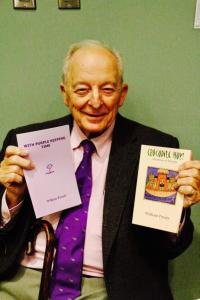William Prouty

Photo: Nathalie Rivard; Tempo Lac-Brome
William Prouty (author, poet, editor, teacher) was born in Bondville, Quebec on 24 November 1932. He published several collections of poetry and literary miscellany, including The Locke of Grasse (1969), The Non-Alternative Nightmare (1970), Hitch-Hiker to Eternity (1971), A Past of One’s Own (1980), Numbered Dimensions (1987), and Crocodile Hoy! Adventures in Ethiopia (2012). In retirement, Prouty worked on his “ongoing project of recollections” (Interview with Author).
Prouty was the son of Harold Prouty and Annie Eldridge of Bondville, Quebec. His father was a farmer and a postmaster. His mother descended from ancestry who sailed on the Mayflower. Prouty spent his time as a child roaming the fields and woods around Brome Lake. He began his love of literature at a very young age, that love a result of being taught to read by his aunt Helen at age four while sitting on the kitchen table. He went to Knowlton Academy in the mornings and came home in the afternoons to teach his younger sister what he had learned. He spent holidays in the attic of his grandparents’ house reading stacks of comics from the 1920s Boston Globe. When he was thirteen, he had pneumonia and read numerous Ranch Romances, devouring as many as he could locate. Prouty said “anyone addicted to reading knows that it does not matter what one reads but that one reads” (Interview with Author).
Prouty pursued post-secondary studies at Bishop’s University; he then went to the University of New Brunswick, where he came under the direction of Desmond Pacey and David Galloway. After attaining his BA and MA degrees, he fulfilled a dream by attending Oxford University. That was followed by terms at the University of Birmingham’s Shakespeare Summer School and San Francisco State University.
Prouty spent most of his career teaching literature. He taught at McGill University from 1958–61 and then taught at Addis Ababa University College Haile Selassie from 1961–66. In 1967 he moved to the Rothesay Collegiate School in Saint John and then to the University of New Brunswick Saint John for the rest of his career. Throughout his career, he specialized in classes on science fiction, utopian literature, and Shakespeare. Although he retired from UNB Saint John in 1998, he has continued to teach in various non-institutional capacities.
Prouty’s literary influences were Arthur Motyer, his first literature professor at Bishop’s University, who befriended and supported him throughout his career, and Fred Cogswell, who was a devoted supporter of young writers in New Brunswick. Prouty also admired Liliane Welch for her dedication to poetry.
In ways similar to Cogswell's, Prouty spent much time creating opportunities for writers and sitting on committees for New Brunswick authors. He was president of the New Brunswick Writers’ Federation, president of Saint John Heritage Trust, and director of the Anglo American Polish Association. He is probably best remembered, however, for his creation of and work with the Purple Wednesday Society. The Purple Wednesday Society was and continues to be a locus for literary events, literary discussion, and literary concern in Saint John. Its events include films, concerts, art shows, and the publishing of local authors. The society began in the 1970s with Prouty wearing his favorite color, purple, on a Wednesday. Still active today, the Society has supported upwards of forty publications.
In 1985 Prouty received an Award of Merit from the Association of Canadian Studies for his contributions to Canadian literature. While at Bishop's University he was the editor of the Mitre, which is the oldest Canadian university student literary magazine today. While teaching in Ethiopia he helped students start a similar magazine for local authors and scholars. In the 1980s the Purple Wednesday Society became co-publisher of The Cormorant, a Saint John literary periodical. Because of that effort he was dubbed the magazine’s “founder and chief maintainer” by Fred Cogswell (21). The Cormorant is no longer published, but its final issue in Fall 1998 was dedicated to Prouty, with, of course, the color purple prominently displayed.
Prouty’s poetry ranges widely in theme and form. His colourful and cultured ways are evident in his predominantly liberal stances, stances that enable readers to see connections between nature and humanity. “The beauty and abundance of nature and the vagaries of human friendship” are his dominant preoccupations, each, he implies, inter-connected (Interview with Author). Typically in his poetry a memory ignites a narrative, which then captures something universal. Poems from A Past of One’s Own, which Prouty published under the pseudonym Alexander McGinnis, do this:
snowstorms were exciting
everything became soft
and the nights were soundless
lying in bed was like hibernating
sunshine showed us
drifts as high as horses
through them we dug
labyrinthine forts
from which to attack
neanderthal neighbours. (6)
The ease in Prouty’s poetry recollects the comforts of the childhood times he revisits. This ease establishes both connection and resonance with others’ memories.
Upon retirement, Prouty returned to his home of Bondville, Quebec where he continued to write, teach, and promote his eclectic interests in literature and language. He died in 2018.
Abigail Hallett, Fall 2014
St. Thomas University
Bibliography of Primary Sources
Prouty, William. Crocodile Hoy! Adventures in Ethioipia. Saint John, NB: The Purple Wednesday Society, 2012.
---. E-mail interview. Oct. 2014.
---. Hitch-Hiker To Eternity. Saint John, NB: The Purple Wednesday Society, 1971.
---. The Locke of Grasse. Saint John, NB: n.p., 1969.
---. The Non-Alternative Nightmare. Saint John, NB: The Purple Wednesday Society, 1970.
---. Numbered Dimensions. Saint John, NB: The Purple Wednesday Society, 1987.
--- [Alexander McGinnis, pseudo.]. Un passé qui est à soi / A Past of One’s Own. Trans. E.P. Mayberry Senter. Saint John, NB: Purple Wednesday Society, 1980.
Bibliography of Secondary Sources
Cogswell, Fred. “William Prouty: An Appreciation.” The Cormorant (Fall 1998): 21.
Davidson, Jessica. "The Purple Wednesday Society." New Brunswick Literary Encyclopedia. Ed. Tony Tremblay. Fredericton, NB: New Brunswick Studies Centre, 2010.
<https://nble.lib.unb.ca/browse/p/purple-wednesday-society>.
Noble, Carol-Ann. “To WP…” The Cormorant (Fall 1998): 54.


